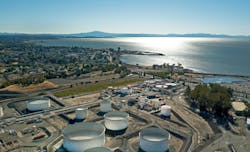Contra Costa gives green light for refinery conversion advancement
Marathon Petroleum and Phillips 66 can move ahead with plans to convert existing refineries to produce renewable fuels.
California’s Contra Costa County Board of Supervisors approved land use permits May 3 for both companies, and approved Marathon’s final environmental impact report (FEIR), concluding the required environmental review process under the California Environmental Quality Act. Phillips 66 had been granted FEIR approval in March.
The county’s Planning Commission voted 6-0 on Mar. 30 to approve the permit but appeals by project opponents triggered a special meeting and final vote by the Board of Supervisors.
Marathon Petroleum has plans to convert its now-idled Martinez, Calif., refinery into a renewable fuels production site (OGJ Online, Aug. 3, 2020). The reconfigured refinery is expected to produce 260 million gas/year of renewable diesel in second-half 2022, with pretreatment capabilities to come online in 2023, and expanded production capacity to 730 million gal/year by end 2023.
Phillips 66's Rodeo Renewed project envisions converting the 120,000-b/d portion of its San Francisco refining complex in Rodeo, Calif., into a renewable fuels refinery (OGJ Online, Aug. 23, 2021). Following the vote, the company said it expects to make final investment decision on the project “in the coming weeks.”
In 2020, Phillips 66 announced plans to pivot its Bay Area refinery away from processing crude oil and toward renewables. With Rodeo Renewed, Phillips 66 intends to use a variety of renewable raw materials—fats, oils, and greases—to produce lower-carbon transportation fuels beginning in early 2024.
The converted refinery stands to have an initial production capacity of 800 million gas/year (50,000 b/d) of renewable diesel, renewable gasoline, and sustainable aviation fuel.
